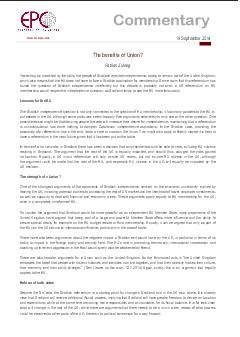Zuleeg, F. (2014) “The benefits of Union?“, Commentary, EPC Publications, 19 Σεπτεμβρίου.
Yesterday, as predicted by the polls, the people of Scotland rejected independence, opting to remain part of the United Kingdom, which also means that the EU does not have to face a Scottish application for membership. Some claim that this referendum has buried the question of Scottish independence indefinitely but this debate is probably not over: a UK referendum on EU membership would reopen the independence question, as Scotland tends to see the EU more favourably.
Lessons for the EU
The Scottish independence question is not only connected to the question of EU membership, it has many parallels to the EU in-out debate in the UK, although some politicians seem to apply their arguments selectively to only one or the other question. One possible lesson might be that denying people the vote will increase their desire for independence: maintaining that a referendum is unconstitutional has done nothing to dampen Catalonian independence aspirations. In the Scottish case, providing the possibility of a referendum has in the end, led to a vote to maintain the Union. This might also apply to Brexit: maybe it is best to have a referendum in the near future, given that it has been put on the table.
In terms of who can vote, in Scotland there has been a decision that only residents would be able to vote, including EU citizens residing in Scotland. The argument that the rest of the UK is equally impacted, and should thus also get the vote, gained no traction. Equally, a UK in-out referendum will only involve UK voters, but not include EU citizens in the UK, although the argument could be made that the rest of the EU, and especially EU citizens in the UK, will equally be impacted by the UK decision.
Σχετικές αναρτήσεις:
- Whyman, P. B. (2014) “Keynes and the International Clearing Union: A Possible Model for Eurozone Reform?“, JCMS: Journal of Common Market Studies. doi: 10.1111/jcms.12180, 07 Αυγούστου.
- McCormick, J. (2014) “The Meaning of a British Exit from the European Union“, LSE EUROPP, 29 Ιουλίου.
- Maçães, Β. (2014) “An ever closer union?“, VoxEU Organisation, 09 Ιουλίου.




